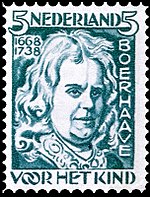

The depiction of chemistry on stamps began in 1923 with the issue of a set of definitive French stamps commemorating the chemist and microbiologist Louis Pasteur.[1] Another early chemical stamp depicted the botanist and chemist Herman Boerhaave.[2] The depiction of chemistry on stamps contributes to chemical education[3][4] and to the public understanding of science.[5][6]
- ^ Klickstein, Herbert S.; Leicester, Henry M. (1947). "Philately - A Chapter in the History of Chemistry". Journal of the History of Medicine and Allied Sciences. 2 (3): 337–378. doi:10.1093/jhmas/ii.3.337. PMID 20266807.
- ^ Schaeffer, H.F. (May 1934). "Philately serves chemistry". Journal of Chemical Education. 11 (5): 259-266. Bibcode:1934JChEd..11..259S. doi:10.1021/ed011p259.
- ^ Rappoport, Zvi (1992). "Chemistry on Stamps (Chemophilately)". Accounts of Chemical Research. 25: 24-31. doi:10.1021/ar00013a004.
- ^ Schreck, James O. (April 1986). "Postage Stamps as a Teaching Tool in Chemistry". Journal of Chemical Education. 63 (4): 283-287. doi:10.1021/ed060p128.
- ^ Yardley, Christopher B. (2015). The representation of science and scientists on postage stamps (PDF). Canberra: ANU Press. ISBN 978-19250-2178-3.
- ^ Krall, Madison A.; Parks, Melissa M.; Krebs, Emily; Mann, Benjamin W.; Maison, Kourtney; Jensen, Robin E. (2022). "Chemistry in the mail: Stamps from around the globe and public science communication in the twentieth century". Public Understanding of Science. 31 (2): 136–151. doi:10.1177/09636625211032465. PMID 34319183.